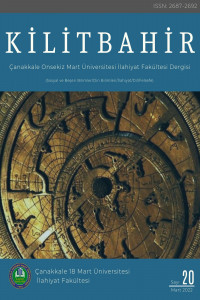Zwingli'de Dini Olanın Seküler Olan ile Çatışması / Kavuşması: Sola Scriptura /ʺYalnızca Kutsal Kitapʺ Kanalıyla Din ile Devletin Denge Arayışı Projesi
Kilise ile devletin birbirinden ayrı ve kopuk iki unsur olarak görülmesi yanlıştı; aksine her
ikisi de tek bir gerçeğe işaret ederler ve Tanrı’nın bağımsız emrinin koruması altındadır.
Bundan dolayı da her ikisi de Tanrı’nın hizmetkârları olarak kabul edilirler ve ilahî iradenin
icracılarıdırlar. Öte yandan, dinî ve seküler otoritenin rolleri ve fonksiyonları farklıdır ve farklı
seviyelerde faaliyet gösterirler. Önceki otorite (dinî), Tanrı’nın “söz”ünü söylem ve eylemlerle
gerçekleştirir ve onunla yönetir; sonraki otorite (seküler) de Tanrı’nın iradesini “kılıç” ile
O’nun iradesinin vasıtası olarak gerçekleştirmeye çalışır. Bu yüzden, kilise ve devlet
birbirleriyle ortaklaşa çalışırlar; birlikte hareket ederler; bununla birlikte bu iki güç tek bir
kişide toplanmaz. Son tahlilde “kılıç”; iyiliği ve iyiyi koruma ölçü ve vasıtasıdır; aynı zamanda
Kutsal Kitap’ın tebliğcisidir. Bunlara bağlı olarak, Zwingli’nin reform projesinin özeti ve tezi
şudur: “Kilise ve devletin dengesi ve insicamı, ‘kılıç’ ile korunsn ve desteklenen Yalnızca
Kutsal Kitap iledir.
Anahtar Kelimeler:
Zwingli, Yalnızca Kutsal Kitap, Yalnızca İnanç, Yalnızca Rahmet
The Religious vs / Cooperates with the Secular Zwingli: A Church & State Equilibrium through Sola Scriptura (“Only Scripture”)
Viewing that church and state are not two distinct and apart entities; rather one and under
the sovereign commandment of God, Zwingli claims that the religious authority and the secular
authority are expected to serve for the wellbeing of the whole community and its life. Hence, both
are regarded as the servants of God, serving and carrying out the will of the divine. On the other
hand, the roles and functions of minister (religious authority) and of magistrate (secular
authority) are different and act in various levels. The former administers and actualizes the
“word” of God through its actions and discourses; whereas the latter implements the will of God
through the “sword”, an instrument of God. Hence, church and state cooperate with one
another; work together; yet not in the same person. In the last analysis, the “sword” is a real and
proper measure and means in preserving the good and proclaiming the Scriptura. Thence, the
Zwinglian reformation project offers “a church and state equilibrium through Sola Scripture
preserved and protected by the sword.
Keywords:
Zwingli, Sola Scriptura, Sola Fide, Sola Gratia, Sword, Secular Authority Religious Authority, Church-State Equilibrium, Ministry, Magistrate,
___
Baker, J. Wayne. "Church, State, and Dissent: the Crisis of the Swiss Reformation, 1531-1536" in Church History, vol. 57, (1988).Blanke, Fritz- Oskar Farner, Rudolf Pfister. Zwingli Hauptschriften, bearbeitet (in course of publication) (Zürich: Zwingli-Verlag, 1940).
Brock, Peter. The Political and Social Doctrines of the Unity of Czech Brethren in the Fifteenth and Early Sixteenth Centuries, edited by Cornelis H. Van Schooneveld (The Hague: Mouton; 1957).
Copeland, Rita. Pedagogy, Intellectuals, and Dissent in the Later Middle Ages: Lollardy and Ideas of Learning (Cambridge, England: Cambridge University Press, 2001).
Courvoisier, Jaques. Zwingli: A Reformed Theologian (Richmond, VA.: John Knox Press, 1963).
Farner, Alfred. Die Lehre von Kirche und Staat bei Zwingli (Tübingen: J. C. B. Mohr, 1930).
Farner, Oskar. Huldrych Zwingli, 4 vols. (Zürich: Zwingli-Verlag, 1943-1960).
Farner, Oskar. Zwingli the Reformer, translated by D. G. Sear from Huldrych Zwingli, der schweizerische Reformator (New York: Philosophical Library, 1952); (German edition, Emmishofen: Johannes Blanke Verlag, 1917).
Fife, Robert Herndon. The Revolt of Martin Luther (New York: Columbia University Press, 1957).
Flick, Alexander Clarence. The Decline of the Medieval Church. Volume: 2. (London: K. Paul, Trench, Trubner, 1930).
Gourvoisiew, Jaques. Zwingli (Genève: Labor et Fides, 1947).
Havens, Jill C. Derrick G. Pitard, Fiona Somerset. Lollards and Their Influence in Late Medieval England (Rochester, NY: Boydell Press, 2003).
Heller, Clarence Nevin (editor). The Latin Works of Huldreich Zwingli, vol. I-III (Philadelphia: the Heidelberg Press, 1929).
"Huldreich Zwingli", The Columbia Encyclopedia, 6th ed..(The Colombia University Press, 2013).
Hoffmann, Richard C. Land, Liberties, and Lordship in a Late Medieval Countryside: Agrarian Structures and Change in the Duchy of Wroclaw (Philadelphia: University of Pennsylvania Press, 1989).
Jackson, Samuel Macauley. Huldreich Zwingli (New York: G. P. Putnam's Sons, 1901).
Koehler, Walther. Huldrych Zwingli (Leipzig: Koehler & Amelang, 1943).
Koehler, Walther. Zrcher Ehegericht und Genfer Konsistorium (Leipzig: Heinsius, 1932- 1942).
Limberis, Vasiliki. “Symbol and Sanctification: An Orthodox Critique of Zwingli,” Greek- Orthodox Theological Review, xxi (1981).
Macauley, Jackson Samuel (editor of vol. I)-William John Hinkle (editor of vol. II). The Latin Works of Huldreich Zwingli, together with selections from his German works, 2 Vols.( Philadelphia: The Heidelberg Press, 1922).
McSheffrey, Shannon. Gender and Heresy: Women and Men in Lollard Communities, 1420-1530 (Philadelphia: University of Pennsylvania Press, 1995).
Mullett, Michael. "Zwingli and the Urban Reformation" in History Review. no 28 (1997).
Schaff, Philip. History of the Christian Church. volume: 1 (New York: C. Scribner's Sons, 1882).
Schmid, Heinrich. Zwinglis Lehre von der göttlichen und menschlichen Gerechtigkeit (Zürich: Zwingli-Verlag, 1959).
Stephens, W. Peter. The Theology of Huldrych Zwingli (Oxford: Clarendon Press, 1986).
Stephens, W. Peter. Zwingli: An Introduction to His Thought (Oxford: Oxford University, 1992).
www. en.wikipedia.org/wiki/Huldrych_Zwingli (25.04.2007).
Zwingli and Bullinger. Library of Christian Classics, vol. XXIV. (Philadelphia: The Westminster Press, 1953).
Zwingli, Huldreich. Aus Zwinglis Predigten, bearbeitet von Oskar Farner (Zürich: Verlag Berichthaus, 1957). Zwingli, Huldreich. Huldreich Zwinglis Sämtliche Werke (Corpus reformatorum, vols. 88 ff.) (in course of publication) (Leipzig: Heinsius, from 1905).
Zwingli, Huldreich. Huldreich Zwinglis Werke, Ausgabe durch Schuler und Schulthess, 8 vols. (Zürich: Friedrich Schulthess, 1828).
Zwingli, Ulrich. “On True and False Religion,” Works of Huldreich Zwingli, ed. G.W. Heller, vol. 3 (Philadelphia: The Heidelberg Press, 1929).
- Yayın Aralığı: Yılda 2 Sayı
- Başlangıç: 2012
- Yayıncı: Çanakkale Onsekiz Mart Üniversitesi
